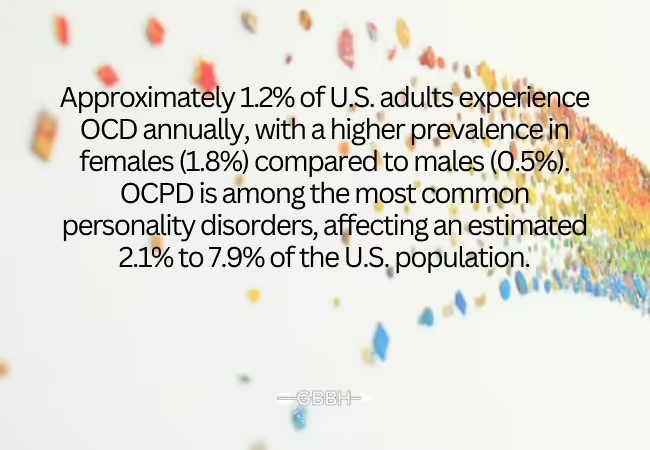Obsessive-Compulsive Disorder (OCD) and Obsessive-Compulsive Personality Disorder (OCPD) are two mental health conditions that are often misunderstood and misdiagnosed due to their similar-sounding names. While they share some overlapping traits, these disorders are distinct in their causes, symptoms, and treatment approaches. Understanding the differences is crucial for effective diagnosis and tailored treatment. At Greater Boston Behavioral Health, we provide specialized care for both OCD and OCPD, leveraging evidence-based therapies such as CBT Therapy and DBT Therapy to promote healing and resilience.
What is Obsessive-Compulsive Disorder (OCD)?
OCD is an anxiety disorder marked by persistent, intrusive thoughts (obsessions) and repetitive behaviors or mental acts (compulsions) performed to alleviate the distress caused by these obsessions. People with OCD are often aware that their thoughts and behaviors are irrational but feel powerless to stop them. This condition can severely disrupt daily life and cause significant emotional distress.
Key Symptoms of OCD
- Obsessions:
- Unwanted, intrusive thoughts, images, or urges that trigger intense anxiety or distress.
- Examples include fears of contamination, harm, or violating moral standards.
- Compulsions:
- Repeated behaviors or rituals performed to reduce the anxiety caused by obsessions.
- Examples include excessive cleaning, checking, counting, or seeking reassurance.
Impact on Daily Life
OCD can interfere with work, relationships, and overall well-being. For instance, someone with contamination obsessions might avoid social interactions out of fear of germs, while someone with checking compulsions may struggle to leave home due to repetitive rituals.
Treatment for OCD
- Cognitive Behavioral Therapy (CBT): Specifically, Exposure and Response Prevention (ERP), a type of CBT, is the gold standard treatment. ERP involves gradually exposing individuals to their fears while helping them resist the urge to engage in compulsive behaviors.
- Medication: Selective Serotonin Reuptake Inhibitors (SSRIs) can help manage symptoms by altering brain chemistry.
- Supportive Care: Joining support groups and engaging in stress-reduction techniques can enhance therapy outcomes.
What is Obsessive-Compulsive Personality Disorder (OCPD)?
OCPD is a personality disorder characterized by a pervasive pattern of perfectionism, rigidity, and an excessive need for control. Unlike OCD, individuals with OCPD typically view their behaviors and thoughts as appropriate or even desirable, often believing their high standards are necessary for success or morality.
Key Symptoms of OCPD
- Perfectionism:
- Extreme attention to detail, often leading to inefficiency and missed deadlines.
- Struggles to delegate tasks due to fear that others won’t meet their standards.
- Rigidity and Control:
- A strict adherence to rules, schedules, and order, often at the expense of relationships and flexibility.
- Work-Centric Behavior:
- A preoccupation with productivity that leaves little time for leisure or socializing.
Impact on Daily Life
OCPD can strain relationships due to the individual’s inflexibility and high expectations. For example, a person with OCPD might insist on completing tasks their way, creating tension in collaborative environments.
Treatment for OCPD
- Dialectical Behavior Therapy (DBT): DBT helps individuals develop emotional flexibility and improve interpersonal skills. It also fosters mindfulness, which helps them accept and adapt to situations outside their control.
- Psychotherapy: Long-term therapy focuses on reducing perfectionistic tendencies and improving adaptability.
- Medication: While less commonly used, medications may be prescribed to address co-occurring anxiety or depression.
Key Differences Between OCD and OCPD
| Aspect | Obsessive-Compulsive Disorder (OCD) | Obsessive-Compulsive Personality Disorder (OCPD) |
|---|---|---|
| Primary Focus | Anxiety related to intrusive thoughts or fears | Perfectionism and a need for control in all areas |
| Awareness | Recognizes thoughts and behaviors as irrational | Believes behaviors and standards are reasonable |
| Symptoms | Obsessions and compulsions | Rigid personality traits, perfectionism |
| Impact on Functioning | Causes significant distress and disruption | Affects relationships and flexibility in daily life |
| Treatment Focus | Reducing anxiety and compulsions | Developing adaptability and emotional regulation |
How OCD and OCPD Affect Daily Life
Both OCD and OCPD can significantly disrupt an individual’s daily functioning, but the ways they manifest and impact life differ.
Obsessive-Compulsive Disorder (OCD)
People with OCD often find their days consumed by intrusive thoughts and the compulsive behaviors meant to neutralize them. This can lead to:
- Time Management Issues: Repeated rituals such as handwashing, checking, or counting can take hours out of a day, leaving little time for work, relationships, or leisure.
- Emotional Distress: Persistent anxiety caused by obsessions can lead to feelings of frustration, guilt, and exhaustion.
- Social Isolation: Embarrassment or fear of judgment may cause individuals to avoid social interactions, further impacting their relationships and mental health.
For example, someone with contamination fears may avoid touching surfaces or shaking hands, making daily errands or work tasks feel overwhelming and unmanageable.
Obsessive-Compulsive Personality Disorder (OCPD)
While OCPD may not include the intrusive anxiety of OCD, its perfectionistic tendencies and need for control can lead to:
- Strained Relationships: Rigid thinking and a refusal to compromise can create tension with loved ones, colleagues, or friends.
- Work-Life Imbalance: Excessive focus on work productivity often comes at the expense of personal well-being and relationships.
- Decision Paralysis: The fear of making a mistake can lead to indecisiveness, delaying tasks and causing frustration.
For instance, someone with OCPD may spend hours meticulously organizing a workspace, leaving no time to complete actual tasks, creating inefficiency despite their intentions.
The Role of Goal-Setting in Building Hope
Goal-setting is a crucial part of managing both OCD and OCPD. For individuals with OCD, setting goals helps them focus on incremental progress, such as reducing the time spent on compulsions. For those with OCPD, setting realistic and flexible goals encourages them to balance productivity with leisure and relationships.
At Greater Boston Behavioral Health, our therapists guide clients in creating SMART goals—Specific, Measurable, Achievable, Relevant, and Time-bound. For example:
- For OCD: Gradually reducing handwashing from 20 times a day to 15, then to 10.
- For OCPD: Allowing flexibility in a weekly schedule to include social activities or self-care.
By achieving these goals, individuals build confidence and resilience, fostering a greater sense of control over their mental health journey.
Overcoming Barriers to Seeking Treatment
Despite the availability of effective treatments, many individuals face obstacles when seeking help for OCD and OCPD. These barriers can include:
1. Misunderstanding the Condition
- People often confuse OCD with being overly tidy or OCPD with simply being a perfectionist, trivializing the challenges these disorders pose.
- Lack of awareness can prevent individuals from recognizing the need for professional help.
2. Stigma
- The fear of being judged or labeled can discourage individuals from discussing their struggles or reaching out for treatment.
- Mental health stigma, both societal and self-imposed, often delays intervention.
3. Resistance to Change
- Especially in OCPD, rigid thinking patterns can make individuals resistant to therapy, as they may not perceive their behaviors as problematic.
- For OCD, the fear of confronting obsessions during therapy can seem overwhelming.
4. Access and Availability
- Limited access to specialized care, such as Mental Health Therapy Programs or experienced therapists, can create logistical challenges.
- Financial concerns or lack of insurance coverage may also act as barriers.
Overcoming These Barriers
- Education: Spreading awareness about the true nature of OCD and OCPD helps individuals and their loved ones understand the need for professional care.
- Supportive Environments: At GBBH, we create a judgment-free space where clients feel safe and supported in their recovery journey.
- Accessible Resources: Offering comprehensive programs, including CBT Therapy and DBT Therapy, ensures individuals receive personalized care tailored to their needs.
Overcoming Barriers to Treatment
Despite the availability of effective treatments, barriers often prevent individuals from seeking help. These may include:
- Stigma: Fear of judgment can delay individuals from acknowledging their need for help.
- Misunderstanding: Confusing OCD with OCPD can lead to ineffective treatment plans.
- Rigid Thinking Patterns: Especially in OCPD, the belief that one’s way is the only right way can hinder therapy.
Overcoming these barriers starts with education and open communication. At our Mental Health Treatment Center in Boston, we create a safe and supportive environment where clients feel empowered to address their challenges without fear of judgment.
Conclusion
While OCD and OCPD share some surface similarities, they are fundamentally different in their causes, symptoms, and treatment needs. Understanding these differences is essential for effective diagnosis and therapy. At Greater Boston Behavioral Health, we provide tailored Mental Health Therapy Programs to address the unique challenges of each condition. Our evidence-based approaches, including CBT Therapy for OCD and DBT Therapy for OCPD, empower individuals to regain control over their lives and foster hope for a brighter future.
If you or someone you know is struggling with symptoms of OCD or OCPD, contact us today to learn how we can help. Together, we can build the tools for resilience and long-term well-being. Call us at (888)278-0716 today to learn more about our services and how we can help you on your journey to recovery!
FAQ on Difference Between on OCD vs OCPD
What is the main difference between OCD and OCPD?
OCD involves intrusive thoughts (obsessions) and repetitive behaviors (compulsions) that cause distress, whereas OCPD is characterized by rigid perfectionism and control that individuals often see as appropriate, even if it impacts their relationships and daily life.
Can someone have both OCD and OCPD?
Yes, it’s possible for an individual to have both conditions, but they are distinct disorders that require different treatment approaches.
How does OCD affect daily life?
OCD can consume significant time and energy with repetitive behaviors or rituals, disrupting work, relationships, and personal activities due to intense anxiety.
How does OCPD affect daily life?
OCPD often leads to strained relationships and inefficiency due to perfectionism and an inability to adapt or delegate tasks, impacting both personal and professional areas.
What treatments are effective for OCD?
Cognitive Behavioral Therapy (CBT), specifically Exposure and Response Prevention (ERP), and medication such as SSRIs are effective in reducing obsessions and compulsions.
What treatments are effective for OCPD?
Dialectical Behavior Therapy (DBT), psychotherapy, and skill-building for flexibility and emotional regulation are common treatments for OCPD.
What is the role of goal-setting in treating OCD and OCPD?
Goal-setting helps individuals with OCD reduce compulsions gradually and those with OCPD focus on balancing productivity with flexibility and personal well-being.


